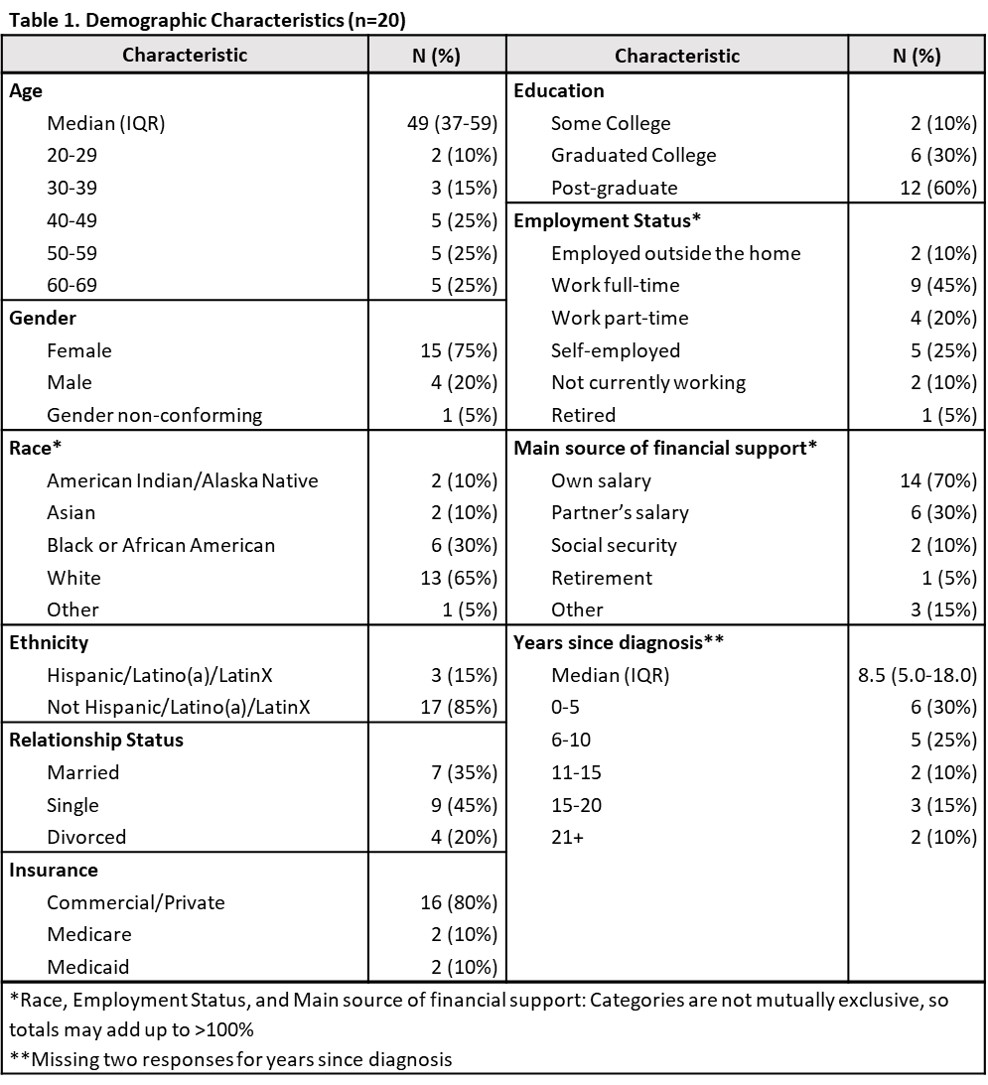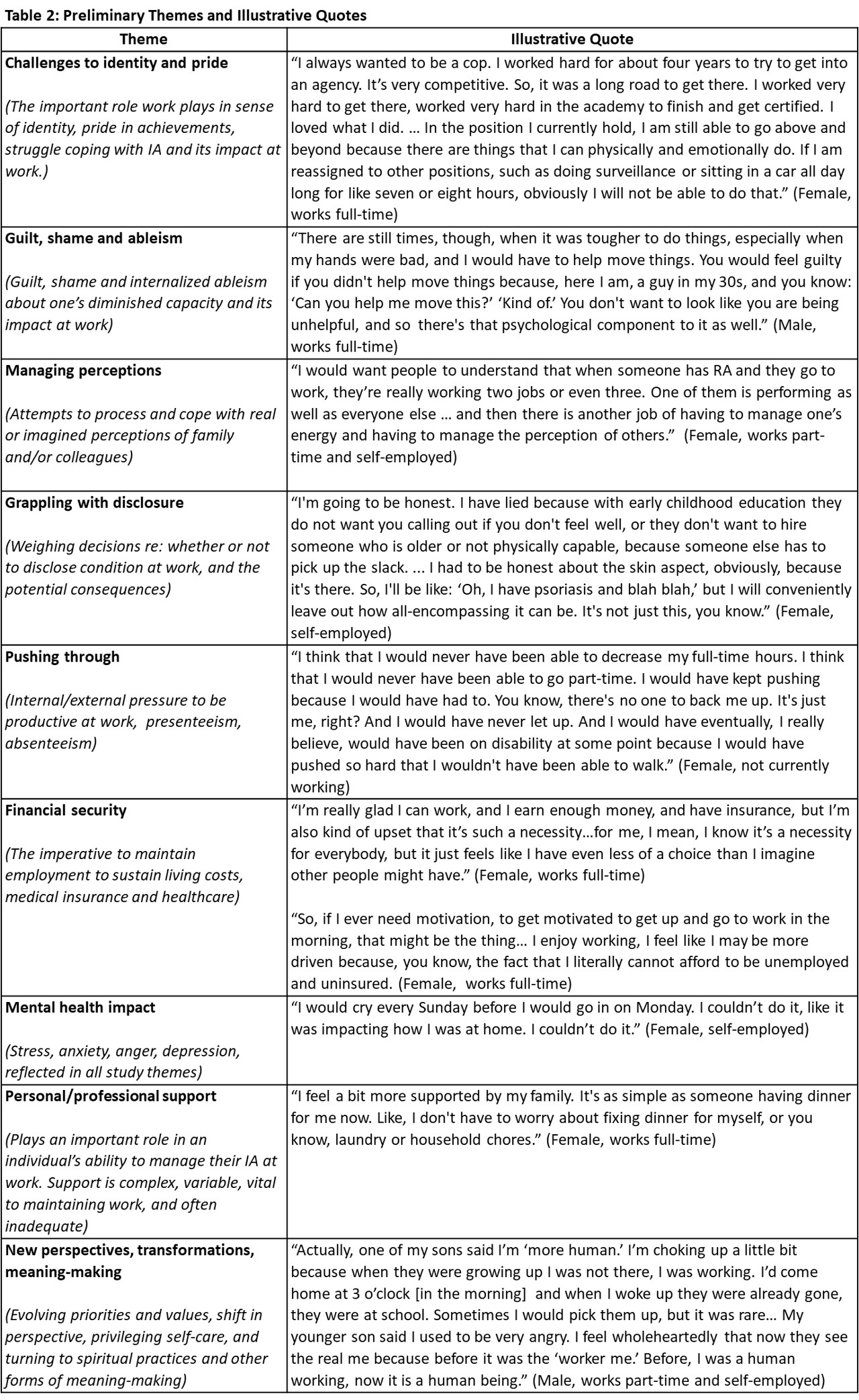Session Information
Date: Monday, November 13, 2023
Title: (1256–1263) Psychology/Social Science – Interprofessional Poster
Session Type: Poster Session B
Session Time: 9:00AM-11:00AM
Background/Purpose: A large body of research reports that people with inflammatory arthritis (IA) are at increased risk for work disability, which profoundly affects all aspects of life. While researchers describe the challenges that people with IA face in maintaining employment, these studies largely focus on addressing concrete barriers and strategies and inadequately explore psychosocial factors that may influence the ability to continue working. A EULAR taskforce recently released points to consider to support people with rheumatic and musculoskeletal diseases, highlighting that “work outcomes comprise … physical and mental health … but also personal and environmental factors. These contextual factors can be barriers as well as facilitators, and are of special interest if they are modifiable.” (Boonen, 2023). This study, therefore, explores the psychological experience of people with IA in their efforts to maintain sustainable work while coping with their illness. Our aim is to report key psychosocial areas of exploration to be considered in a comprehensive evaluation of IA patients.
Methods: In a mixed methods qualitative study, a clinical social work researcher conducted semi-structured interviews with MD-diagnosed IA patients (18+ years, currently employed or within the past 5 years). Interviews were conducted via Zoom, averaged 1 hour in duration, and were recorded and transcribed verbatim. Participants were recruited from an NYC academic hospital by MDs, SWs, and by a community partner.
Using thematic analysis and NVivo software, 4 reviewers conducted preliminary analysis of data of 20 interviews to identify emerging themes. We also collected demographic information (Table 1).
Results: While 40 IA patients participated, we include here preliminary results from 20 interviews. Nine interrelated themes emerged (Table 2): Challenges to identity and pride (achievements, coping with illness’ impact on work); Guilt or shame (diminished capacity, internalized ableism); Managing perceptions (attempts to process and cope with perceptions of others); Grappling with disclosure (and potential consequences); Pushing through (internal/external pressure to function, presenteeism); Financial security (living costs, healthcare); Mental health impact (stress, anxiety, anger, depression reflected in all study themes); Personal/professional support (complex, variable, vital to sustaining work, often inadequate); and New perspectives, transformations and meaning-making (evolving priorities and values).
Conclusion: Preliminary findings demonstrate a significant psychological impact related to IA patients’ efforts to maintain employment while coping with the challenges of their illness. This nuanced perspective is an important area of inquiry for a more holistic patient assessment and can inform multidisciplinary interventions to support IA patients at work. Continued analysis will further describe the diverse needs of people with IA across job type, gender, orientation, race, ethnicity and other factors.
To cite this abstract in AMA style:
Westreich J, Batterman A, Balakrishnan A, Horton R, Nong M, Bykerk V, Fields T. The Psychological Experience of Work for People with Inflammatory Arthritis (IA) [abstract]. Arthritis Rheumatol. 2023; 75 (suppl 9). https://acrabstracts.org/abstract/the-psychological-experience-of-work-for-people-with-inflammatory-arthritis-ia/. Accessed .« Back to ACR Convergence 2023
ACR Meeting Abstracts - https://acrabstracts.org/abstract/the-psychological-experience-of-work-for-people-with-inflammatory-arthritis-ia/


